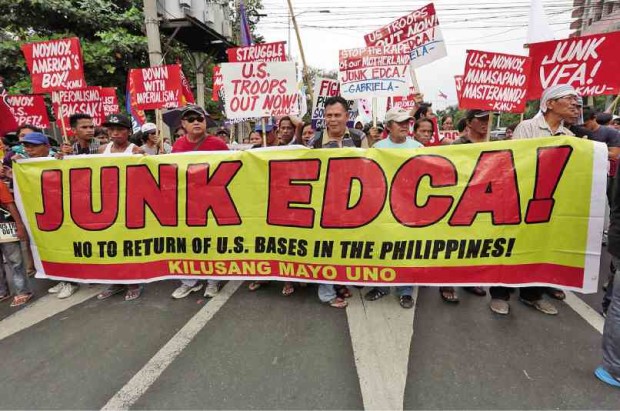
PROTESTERS try to get near the US Embassy in Manila to denounce what they described as a lopsided Enhanced Defense Cooperation Agreement (Edca), a pact signed by Philippine and US government officials. GRIG C. MONTEGRANDE
CAGAYAN DE ORO CITY—Protesters will time the start of what they said are massive rallies against increasing US military presence in the Philippines with a day being commemorated here for a little known battle of the Philippine-American War.
Church leaders in Northern Mindanao said protesters would start a series of rallies against the Enhanced Defense Cooperation Agreement (Edca) between the Philippine and US governments on April 7, the anniversary of the little known Battle of Cagayan de Misamis (the old name of Cagayan de Oro).
On April 7, 1900, dozens of Filipino revolutionaries, led by Gen. Nicolas Capistrano, attacked an American barracks under the command of Col. Edward Goodwin.
At least 52 revolutionaries were killed, nine were wounded and 10 were captured during the Battle of Cagayan de Misamis. The Americans, who had superior firepower, suffered four casualties and nine injuries.
Bravery, patriotism
Though lopsided in favor of the Americans, Bishop Rudy Juliada, of the Iglesia Filipina Independiente (IFI), said the battle should be remembered for the bravery and patriotism of the people of Cagayan de Oro during those times.
On this day, Juliada said Patriyotiko Northern Mindanao, a group led by IFI, would launch the first of a series of mass actions against Edca, which would give American soldiers at least five sites, including the former Lumbia Airport in the city, that they could use as bases in the Philippines.
Many senators had insisted that Edca should be treated as a treaty that needed Philippine Senate concurrence but a ruling by the Supreme Court upholding the pact’s constitutionality rendered these opinions moot.
Bishop Juliada said Edca should be scrapped.
The US Embassy in Manila, on its web site, said Edca will “further strengthen US-Philippine bilateral relations.”
The pact, said the embassy, is a “mutually beneficial agreement that will enhance our ability to provide rapid humanitarian assistance and help build capacity for the Armed Forces of the Philippines.”
“We look forward to working closely with our Philippine partners on the implementation of this agreement,” the embassy said.
But Bishop Juliada said Edca would just continue to reinforce the Philippines’ colonial experience under the United States.
“Education on history and nationalism is vital to this campaign (against Edca),” said Juliada.
“Many of us do not even know our past,” he said. “That is why we are not critical of issues that entail our nation’s future,” he added.
The start of a “citizen-initiated campaign” against Edca, he added, would be in commemoration of the Battle of Cagayan de Misamis and in honor of Filipino revolutionaries who went to battle against the US colonial government.
Legal, moral question
Bishop Melza Labuntog, of the United Church of Christ in the Philippines (UCCP), said while Edca may have been given a stamp of legality by the Supreme Court, the pact’s morality is in question.
“Not all laws and treaties of the land legally passed in [Congress] and approved by the highest [court of the land] represent the voice and sentiments of the people,” said Labuntog.
“They may be legal but not necessarily moral,” said Labuntog in a statement.
Edca, said the UCCP bishop, is an example of “a one-sided pact that does not benefit God’s people.”
“On the contrary, it poses imminent threat to our national sovereignty,” said Labuntog. Jigger Jerusalem, Inquirer Mindanao